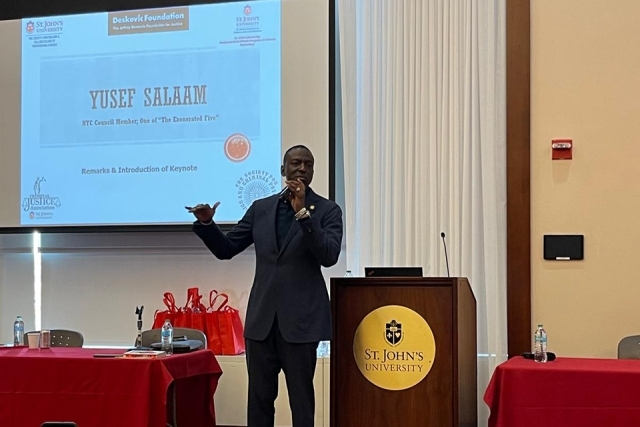
The emotional and psychological challenges faced by those wrongfully convicted of serious crimes were the focus of a daylong panel discussion held at St. John’s University on October 4.
Designed to coincide with International Wrongful Conviction Day on October 2, the conference brought attorneys, mental health professionals, members of the academic community, and several exonerees to the D’Angelo Center Ballroom. Among the panelists were attorney Jeffrey Deskovic, wrongly convicted of murder and rape in 1990, and New York City Council Member Yusef Salaam, wrongly convicted in the Central Park jogger rape case in 1989.
Both agreed that despite the joy of release, the psychological scars from wrongful imprisonment created enduring challenges as they attempted to rebuild their lives.
“It is one thing to come home,” said Mr. Salaam, who represents New York City’s Ninth Council District in upper Manhattan. “It is beautiful and joyful. But it is another thing to recognize that there are no services in place from the system that destroyed you. We had to advocate for ourselves by telling the world there is such a thing as a wrongful conviction.”
“I fought off feelings of abandonment, isolation, and suicide ideation,” Mr. Deskovic added. “I was passed over for employment opportunities. Plus, many of the mental health professionals I saw had never dealt with someone who had been wrongly imprisoned.”
The conference, titled “Unlocking Hope: Addressing Postrelease Trauma in the Wrongfully Convicted,” also featured psychologist and trauma expert James Garbarino, Ph.D., and Sharonne Salaam, mother of Yusef Salaam and founder of Justice 4 The Wrongfully Incarcerated.
Coordinated by Marina Sorochinski, Ph.D., Assistant Professor, Criminal Justice and Homeland Security, The Lesley H. and William L. Collins College of Professional Studies, this inaugural conference of the St. John's Justice Initiative Center focused first on the mental health impact of wrongful convictions and later on reintegration issues faced by exonerees.
“Wrongful convictions don’t just steal years from an individual—they leave deep emotional and psychological scars that can last a lifetime,” Dr. Sorochinski said. “Events like this bring attention to the complex and overlooked challenges exonerees face after release. By focusing on the mental and emotional toll of wrongful imprisonment, we honor the resilience of exonerees and advocate for the support they deserve.”
A St. John’s faculty member since 2020, Dr. Sorochinski has extensively researched the factors that lead to wrongful convictions in serial sexual assault cases. She and Mr. Deskovic have collaborated on several similar panel discussions in the past through Mr. Deskovic’s foundation. Since its establishment in 2009, the Deskovic Foundation has helped to free 14 people wrongfully convicted of crimes and helped to pass nine laws aimed at preventing wrongful convictions.
“Sadly, whether or not the facts are wrong in cases such as these is only half of the equation,” Mr. Deskovic explained. “The other issue is, is the judge going to consider objectively the new facts or arguments? But each new person who makes it out makes it easier for the next innocent person to make it out.”
The Oklahoma Innocence Project estimates that three to five percent of the nation’s prison population, or about 120,000 currently incarcerated people, have been wrongly convicted. Judicial reversals take time and money—as much as $100,000 in some cases—and while some states have established financial compensation pools for exonerees, other postrelease care has been lacking, panelists said.
Jon Eldan, an attorney and founder of After Innocence, a California-based nonprofit that provides postrelease assistance, described a “deeply defective system” in which 12 US states have no process by which exonerees can appeal for compensation. In the remaining 38 states, compensation claims can often fail because of bureaucratic issues.
“Prison is traumatizing,” Mr. Eldan said. “To be imprisoned for something you did not do is even more traumatizing. Yet, in 12 states there is no claim against the government for innocence alone, and in those states where there are processes in place, they are not perfect.”
Panelists agreed that among the issues faced by exonerees are trauma recovery and reintegration support. In his hourlong presentation, Dr. Garbarino, Professor, Department of Psychology at Loyola University, Chicago, noted how exonerees are rarely fully reintegrated into society. He called the trauma from being wrongly incarcerated a “widely misunderstood and underrepresented mental health issue.”
“Many of these people faced confirmation bias from the court system, where they were immediately categorized by the color of their skin and past experiences,” Dr. Garbarino said. “The psychological aspects of their wrongful incarceration remained trivial. We need to get to know them for who they are and look past the false accusations.”
Related News
Answering the Call: Carolyn Moglia Finds Her Stride in St. John’s First Nursing Class
When nursing student Carolyn Moglia walks across the Commencement stage this May, she won’t just be earning a diploma, she’ll be making history. As a member of the first graduating cohort of St. John...
St. John’s Cybersecurity Team Continues Run of Success
For the first time since 2019 and only the second time in its history, St. John’s University’s cybersecurity team has advanced to the regional finals of the Northeast Collegiate Cyber Defense...
St. John’s Conference Highlights Challenges in Insuring of Art and Collectibles
The challenges facing the risk management industry from an evolving art and collectibles sector were the subject of a groundbreaking conference hosted by The Peter J. Tobin College of Business’ Center...
